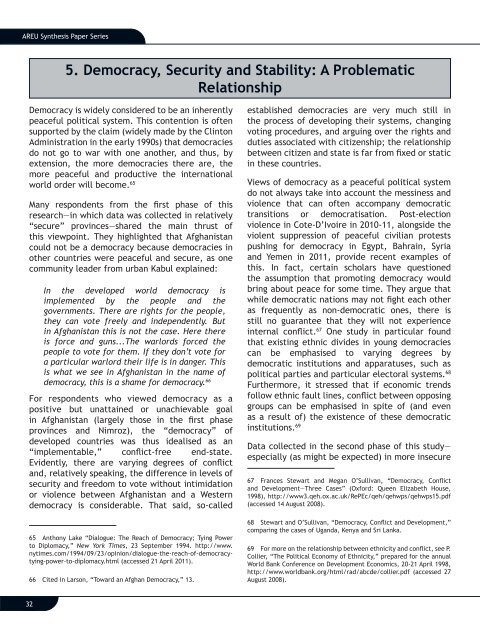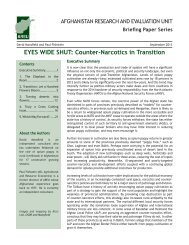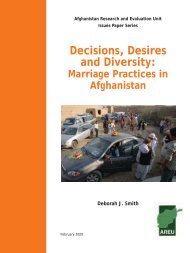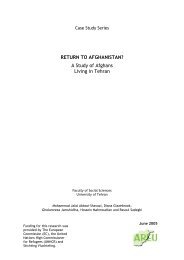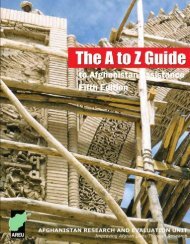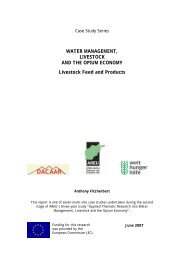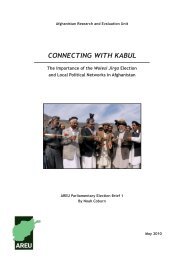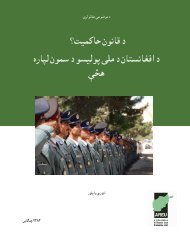“Democracy” in Afghanistan - the Afghanistan Research and ...
“Democracy” in Afghanistan - the Afghanistan Research and ...
“Democracy” in Afghanistan - the Afghanistan Research and ...
Create successful ePaper yourself
Turn your PDF publications into a flip-book with our unique Google optimized e-Paper software.
AREU Syn<strong>the</strong>sis Paper Series<br />
5. Democracy, Security <strong>and</strong> Stability: A Problematic<br />
Relationship<br />
Democracy is widely considered to be an <strong>in</strong>herently<br />
peaceful political system. This contention is often<br />
supported by <strong>the</strong> claim (widely made by <strong>the</strong> Cl<strong>in</strong>ton<br />
Adm<strong>in</strong>istration <strong>in</strong> <strong>the</strong> early 1990s) that democracies<br />
do not go to war with one ano<strong>the</strong>r, <strong>and</strong> thus, by<br />
extension, <strong>the</strong> more democracies <strong>the</strong>re are, <strong>the</strong><br />
more peaceful <strong>and</strong> productive <strong>the</strong> <strong>in</strong>ternational<br />
world order will become. 65<br />
Many respondents from <strong>the</strong> first phase of this<br />
research—<strong>in</strong> which data was collected <strong>in</strong> relatively<br />
“secure” prov<strong>in</strong>ces—shared <strong>the</strong> ma<strong>in</strong> thrust of<br />
this viewpo<strong>in</strong>t. They highlighted that <strong>Afghanistan</strong><br />
could not be a democracy because democracies <strong>in</strong><br />
o<strong>the</strong>r countries were peaceful <strong>and</strong> secure, as one<br />
community leader from urban Kabul expla<strong>in</strong>ed:<br />
In <strong>the</strong> developed world democracy is<br />
implemented by <strong>the</strong> people <strong>and</strong> <strong>the</strong><br />
governments. There are rights for <strong>the</strong> people,<br />
<strong>the</strong>y can vote freely <strong>and</strong> <strong>in</strong>dependently. But<br />
<strong>in</strong> <strong>Afghanistan</strong> this is not <strong>the</strong> case. Here <strong>the</strong>re<br />
is force <strong>and</strong> guns...The warlords forced <strong>the</strong><br />
people to vote for <strong>the</strong>m. If <strong>the</strong>y don’t vote for<br />
a particular warlord <strong>the</strong>ir life is <strong>in</strong> danger. This<br />
is what we see <strong>in</strong> <strong>Afghanistan</strong> <strong>in</strong> <strong>the</strong> name of<br />
democracy, this is a shame for democracy. 66<br />
For respondents who viewed democracy as a<br />
positive but unatta<strong>in</strong>ed or unachievable goal<br />
<strong>in</strong> <strong>Afghanistan</strong> (largely those <strong>in</strong> <strong>the</strong> first phase<br />
prov<strong>in</strong>ces <strong>and</strong> Nimroz), <strong>the</strong> “democracy” of<br />
developed countries was thus idealised as an<br />
“implementable,” conflict-free end-state.<br />
Evidently, <strong>the</strong>re are vary<strong>in</strong>g degrees of conflict<br />
<strong>and</strong>, relatively speak<strong>in</strong>g, <strong>the</strong> difference <strong>in</strong> levels of<br />
security <strong>and</strong> freedom to vote without <strong>in</strong>timidation<br />
or violence between <strong>Afghanistan</strong> <strong>and</strong> a Western<br />
democracy is considerable. That said, so-called<br />
65 Anthony Lake “Dialogue: The Reach of Democracy; Ty<strong>in</strong>g Power<br />
to Diplomacy,” New York Times, 23 September 1994. http://www.<br />
nytimes.com/1994/09/23/op<strong>in</strong>ion/dialogue-<strong>the</strong>-reach-of-democracyty<strong>in</strong>g-power-to-diplomacy.html<br />
(accessed 21 April 2011).<br />
66 Cited <strong>in</strong> Larson, “Toward an Afghan Democracy,” 13.<br />
established democracies are very much still <strong>in</strong><br />
<strong>the</strong> process of develop<strong>in</strong>g <strong>the</strong>ir systems, chang<strong>in</strong>g<br />
vot<strong>in</strong>g procedures, <strong>and</strong> argu<strong>in</strong>g over <strong>the</strong> rights <strong>and</strong><br />
duties associated with citizenship; <strong>the</strong> relationship<br />
between citizen <strong>and</strong> state is far from fixed or static<br />
<strong>in</strong> <strong>the</strong>se countries.<br />
Views of democracy as a peaceful political system<br />
do not always take <strong>in</strong>to account <strong>the</strong> mess<strong>in</strong>ess <strong>and</strong><br />
violence that can often accompany democratic<br />
transitions or democratisation. Post-election<br />
violence <strong>in</strong> Cote-D’Ivoire <strong>in</strong> 2010-11, alongside <strong>the</strong><br />
violent suppression of peaceful civilian protests<br />
push<strong>in</strong>g for democracy <strong>in</strong> Egypt, Bahra<strong>in</strong>, Syria<br />
<strong>and</strong> Yemen <strong>in</strong> 2011, provide recent examples of<br />
this. In fact, certa<strong>in</strong> scholars have questioned<br />
<strong>the</strong> assumption that promot<strong>in</strong>g democracy would<br />
br<strong>in</strong>g about peace for some time. They argue that<br />
while democratic nations may not fight each o<strong>the</strong>r<br />
as frequently as non-democratic ones, <strong>the</strong>re is<br />
still no guarantee that <strong>the</strong>y will not experience<br />
<strong>in</strong>ternal conflict. 67 One study <strong>in</strong> particular found<br />
that exist<strong>in</strong>g ethnic divides <strong>in</strong> young democracies<br />
can be emphasised to vary<strong>in</strong>g degrees by<br />
democratic <strong>in</strong>stitutions <strong>and</strong> apparatuses, such as<br />
political parties <strong>and</strong> particular electoral systems. 68<br />
Fur<strong>the</strong>rmore, it stressed that if economic trends<br />
follow ethnic fault l<strong>in</strong>es, conflict between oppos<strong>in</strong>g<br />
groups can be emphasised <strong>in</strong> spite of (<strong>and</strong> even<br />
as a result of) <strong>the</strong> existence of <strong>the</strong>se democratic<br />
<strong>in</strong>stitutions. 69<br />
Data collected <strong>in</strong> <strong>the</strong> second phase of this study—<br />
especially (as might be expected) <strong>in</strong> more <strong>in</strong>secure<br />
67 Frances Stewart <strong>and</strong> Megan O’Sullivan, “Democracy, Conflict<br />
<strong>and</strong> Development—Three Cases” (Oxford: Queen Elizabeth House,<br />
1998), http://www3.qeh.ox.ac.uk/RePEc/qeh/qehwps/qehwps15.pdf<br />
(accessed 14 August 2008).<br />
68 Stewart <strong>and</strong> O’Sullivan, “Democracy, Conflict <strong>and</strong> Development,”<br />
compar<strong>in</strong>g <strong>the</strong> cases of Ug<strong>and</strong>a, Kenya <strong>and</strong> Sri Lanka.<br />
69 For more on <strong>the</strong> relationship between ethnicity <strong>and</strong> conflict, see P.<br />
Collier, “The Political Economy of Ethnicity,” prepared for <strong>the</strong> annual<br />
World Bank Conference on Development Economics, 20-21 April 1998,<br />
http://www.worldbank.org/html/rad/abcde/collier.pdf (accessed 27<br />
August 2008).<br />
32


